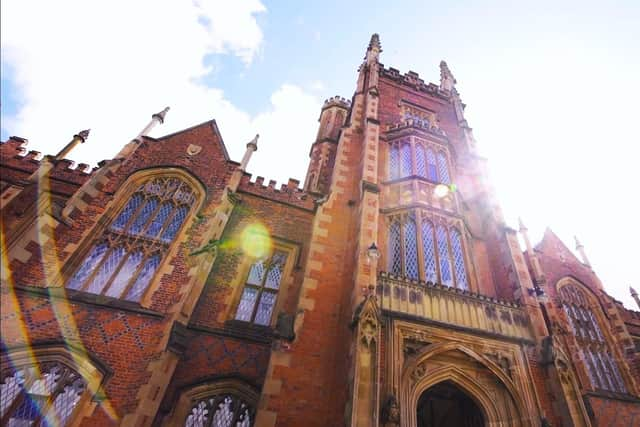Queen's University Belfast eventually coughs up cost of creating Irish language project 'that focuses on positive masculinities to educate boys about healthy consensual relationships'
and live on Freeview channel 276
The News Letter eventually wrung the figure out of Queen's University Belfast after its press office refused to provide it for weeks.
What follows is an account of how difficult it can be for news organisations to obtain even basic information from public bodies.
Advertisement
Hide AdAdvertisement
Hide AdThe story began on November 16 when the university issued a press release about “a new inclusive Irish language sex education resource” called ‘Da mBa Mise Jack’.


This is an Irish-language version of a ‘teaching resource’ that also exists in English, called ‘If I Were Jack’.
This teaching resource amounts to a series of video clips depicting a young Belfast man called Jack, who is told by his girlfriend that she is pregnant.
Each clip shows the pair absorbing the news, telling their friends and family, and considering the prospect of an abortion; afterwards, students are invited to say how they would feel in such circumstances.
Advertisement
Hide AdAdvertisement
Hide AdThis is accompanied by other videos and overhead slides for teachers and exercise materials for pupils.
In the 2021 census, 12.5% of people in Northern Ireland said they have “some ability” in the Irish language – a figure that falls to 3.9% when people were asked if they can speak, read, write and understand the language.
Meanwhile Irish is listed as the “main language” of about 6,000 people, or 0.3% of the population.
-
THE SAGA BEGINS
The press release said that the Irish language version of ‘If I Were Jack’ was “developed by a team led by Professor Maria Lohan from Queen's University Belfast in collaboration with the Council for Curriculum Assessment Northern Ireland, An Chomhairle um Oideachas Gaeltachta agus Gaelscolaíochta (COGG), and Morrow Communications”.
Advertisement
Hide AdAdvertisement
Hide AdThere is no such thing as the Council for Curriculum Assessment; the organisation is called the Council for the Curriculum, Examinations & Assessment.
It is a public body tied to Stormont's Department of Education.
Meanwhile, COGG is a Dublin-based public body, and Morrow Communications is a Belfast PR firm.
In addition, Queen’s said the project was “supported” by the Irish Language Broadcast Fund, a section within NI Screen – another public body based in Belfast.
Advertisement
Hide AdAdvertisement
Hide AdThe News Letter asked how much the Irish language version of the project had cost and who paid for it, since it was not clear which of the organisations mentioned above had actually stumped up cash.
Queen's press office said the money had come from NI Screen, COGG, and NIHR (standing for 'the National Institute for Health and Care Research', a body whose involvement had gone unmentioned in the press release for some reason).
As to the cost, the press office said “we suggest you contact the funders directly”.
This reporter replied: “I'm asking Queen's for the cost of the Irish language project specifically since Queen's – which is a public authority under the Freedom of Information Act – led that project.”
Advertisement
Hide AdAdvertisement
Hide AdA press officer then responded: “We have answered your queries as far as we can.
“We are not the funders and cannot comment on the cost of the overall project.”
The News Letter continued to ask for the cost of the project over the following several days, citing the Freedom of Information Act.
This drew the response: “We have answered your queries as far as we can.
Advertisement
Hide AdAdvertisement
Hide Ad“We have already explained in no uncertain terms to you that we are not the funders and therefore we cannot provide nor comment on the cost.
"We, again, suggest you contact the funding organisations for this information.
“We have nothing further to add.”
It is not the first time recently that Queen's has declined to provide information, only to do so weeks later – see this article, below:
Advertisement
Hide AdAdvertisement
Hide Ad-
‘THIS IS NOT OUR JOB’
The News Letter then took its inquiry to Queen's Freedom of Information (FOI) department, which exists specifically to deal with the university's obligations under the Freedom of Information Act 2000.
This piece of law gives the public at large a “general right of access to information held by public authorities”.
Universities are meant to provide “information on the sources of funding and income, such as funding council grants, tuition fees, endowment, rents and investment income”, according to the Information Commissioner’s Office.
This includes “expenditure over £25,000, including costs, supplier and transaction information ... in enough detail to allow the public to see where money is being spent”.
Advertisement
Hide AdAdvertisement
Hide AdOn December 11 the Queen's Freedom of Information department responded: “The scheme was entirely covered by funders who are content to confirm the cost of the Irish language version of the resource project was £60,658.”
The News Letter then went back to the press office (which consists of 10 people, not including one who is on maternity leave, or another two “internal” communications staff) to ask why it hadn't just provided the cost of the project to begin with.
After a number of prompts, it responded: “We had advised you to contact the funders which the FOI team did on your behalf – you may have received the information quicker if you had went directly [sic].
“It wouldn't fall under the remit of the communications office to get this information for you.
"As you now have the information requested, this matter is now closed.”